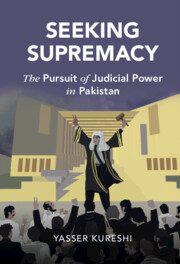Book contents
- Seeking Supremacy
- Cambridge Studies in Law and Society
- Seeking Supremacy
- Copyright page
- Dedication
- Contents
- Figures
- Tables
- Acknowledgements
- Introduction
- Chapter One The Judiciary, Rule of Law and the Military
- Chapter Two The Loyal Court (1947–1977)
- Chapter Three The Controlled Court (1977–1999, Part 1)
- Chapter Four Between the Barracks and the Bar (1977–1999, Part 2)
- Chapter Five The Confrontational Court (1999–2017)
- Chapter Six Epilogue
- Chapter Seven Conclusion and Comparative Perspectives
- Appendix: Structure of the Pakistani Judiciary
- References
- Index
- Cambridge Studies in Law and Society
Chapter One - The Judiciary, Rule of Law and the Military
Published online by Cambridge University Press: 08 September 2022
- Seeking Supremacy
- Cambridge Studies in Law and Society
- Seeking Supremacy
- Copyright page
- Dedication
- Contents
- Figures
- Tables
- Acknowledgements
- Introduction
- Chapter One The Judiciary, Rule of Law and the Military
- Chapter Two The Loyal Court (1947–1977)
- Chapter Three The Controlled Court (1977–1999, Part 1)
- Chapter Four Between the Barracks and the Bar (1977–1999, Part 2)
- Chapter Five The Confrontational Court (1999–2017)
- Chapter Six Epilogue
- Chapter Seven Conclusion and Comparative Perspectives
- Appendix: Structure of the Pakistani Judiciary
- References
- Index
- Cambridge Studies in Law and Society
Summary
Pakistan’s military has been the country’s dominant power centre for most of its post-colonial history, shaping the politics and policies of the state. But the military’s dominance is neither unconstrained nor uncontested. The military is unable to maintain its authority and influence without relying on a coalition of allied bureaucrats, judges, political parties, urban and rural capitalists and civil society organizations. In Pakistan, many use the shorthand term ‘the establishment’ to describe this coalition of formal institutions, associations and interest groups, aligned around a mutual interest in supporting the military’s political agenda. On the other hand, other political parties and segments of civil society have long worked to limit the military’s authority and counter its political agenda. The struggle over maintaining or displacing the military as the primary power centre within the political system has been the axis around which Pakistan’s politics has revolved for decades.
- Type
- Chapter
- Information
- Seeking SupremacyThe Pursuit of Judicial Power in Pakistan, pp. 18 - 47Publisher: Cambridge University PressPrint publication year: 2022

